Changing Music in a Changing Climate
Art and Science Meeting in a Collaborative Space
In January 2020, we invited students working in climate/environment scientific fields to take part in workshops with RNCM students in composition and performance, on pieces inspired by contemporary climate/environment issues. The workshops were led by renowned artists Sarah Nicolls and Laura Bowler. Sarah, pianist and composer, and Laura, vocalist and composer, both create artistic work on the climate and ecological emergency.
We had planned a public evening event at the RNCM, showcasing the work on 15 October 2020, followed by a performance of ‘12 Years‘ by Sarah Nicholls. Of course, COVID-19 and the first lockdown changed all that. In response, the group considered how they might create digitally distributed work and an online event, premiering new work from the project and interviews with the participants, was livestreamed on Thursday 15th October 2020 (see here to watch again and read programme notes for each of the performances). This truly is art responding to science!
Workshop updates
The first workshop took place at the RNCM on 26 February 2020. The group were joined by composer Larry Goves, the RNCM Academic Lead for RNCM Ensemble+, a new initiative to share and exchange learning and teaching with a focus on high-tech remote communication with high fidelity audio, which is being explored as a way to reduce the environmental impact of engagement and collaboration between geographically separated musicians.
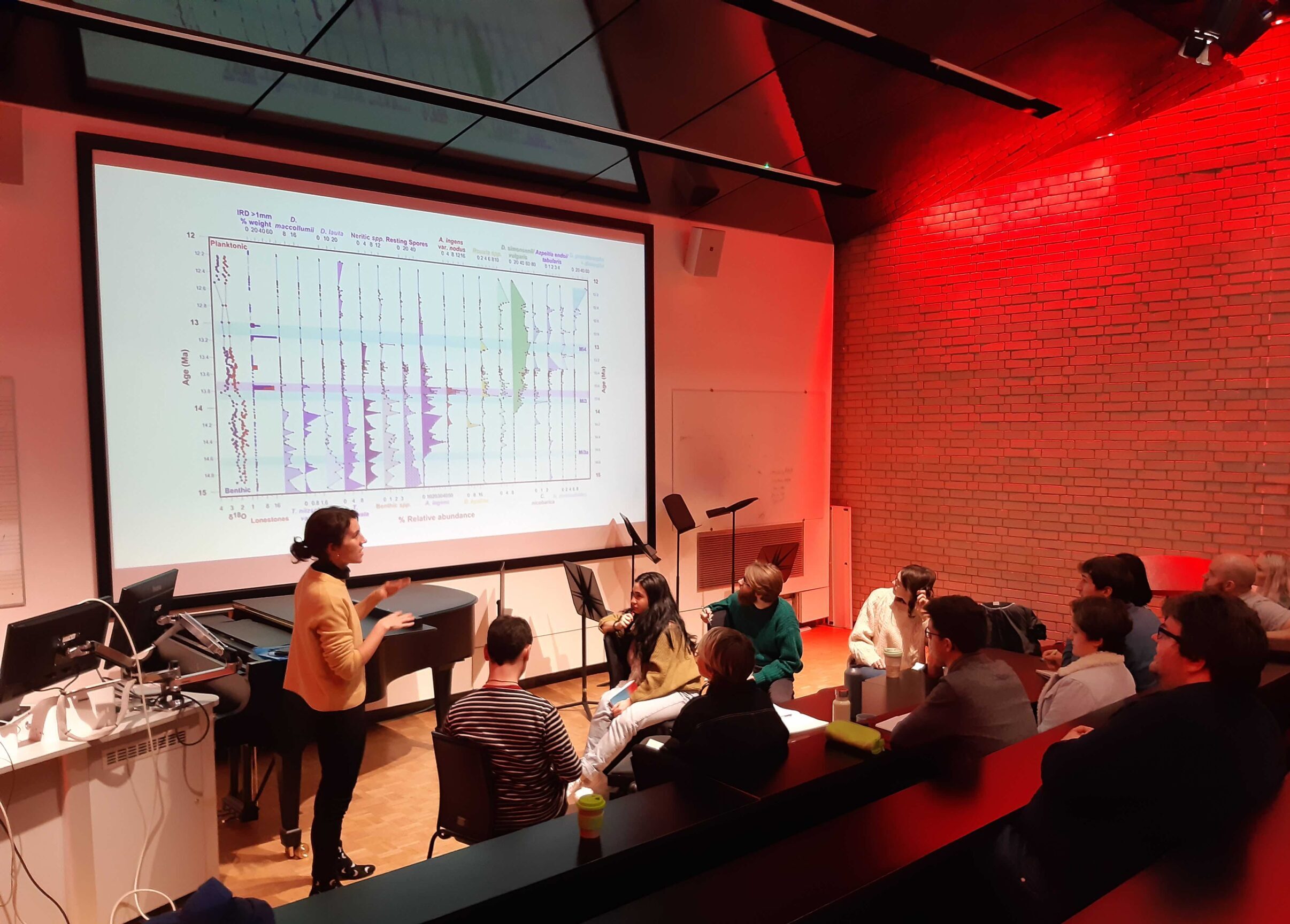
Freya Mitchison sharing her work with the group at the workshop on 26 February 2020
The first Workshop saw the beginning of what I think will be a very meaningful journey for the participants, as they shared their own expertise with each other, learning from across the artificial divides of art and science and meeting in the very real and collaborative space of what I think PRiSM seeks to represent. Sarah Nicolls
We are delighted that the second workshop was able to take place remotely on 10th June 2020 despite the constraints imposed by Coronavirus. Leading academic and climate activist, Julia Steinberger, Professor of Social Ecology & Ecological Economics at the School of Earth & Environment at the University of Leeds, joined the session to give a presentation and Q&A with the student scientists and composers.
It was fascinating to discuss the role of music and culture in the era of the Anthropocene and climate crisis. The young composers of the RNCM obviously want to engage fully, which is both inspiring and challenging. Professor Julia Steinberger
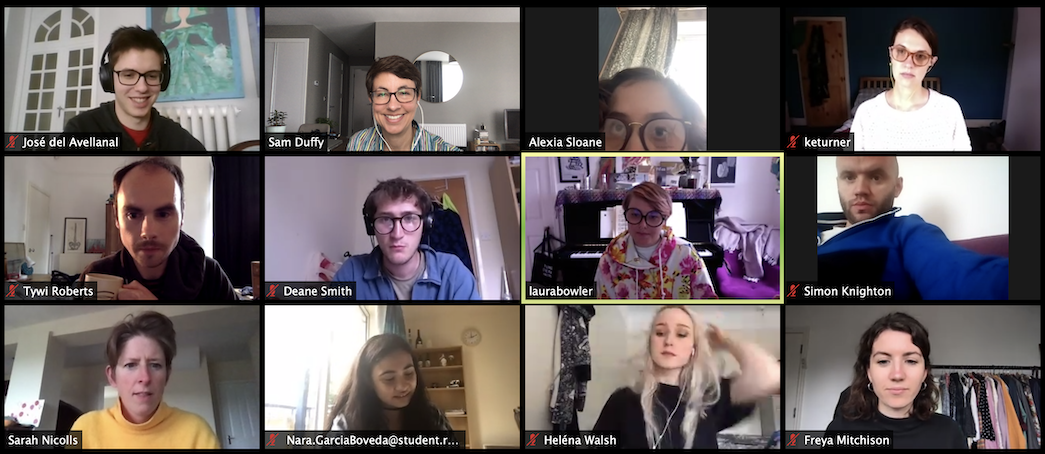
Changing Music in a Changing Climate, Workshop 2, 10 June 2020
Laura and Sarah’s collaboration
Laura and Sarah have both been working independently on musical works responding to the climate and ecological emergency. Sarah’s ‘recital-story’ ’12 Years’ was about to tour the UK when Covid-19 hit, Laura has written a large-scale work about her expedition to Antartica and was also preparing to write an Extinction Rebellion/London Sinfonietta commission. They are now collaborating as Artists-in-Residence for PRiSM on a new work and have just completed a “residency in residencies”.
“We had a 2-day residency to begin work on a collaborative project – a composition in some form that would tackle the global issue of climate change in a tangible, creative way. We began every session with a long zoom or phone conversation and following this we individually developed creative processes and ideas that we then examined and experimented with during the afternoon session. We included a walk and talk where we ventured into our respective nearby nature – Sarah a wild field and Laura an urban park – encouraging us to bring in other subject areas; Wilding, natural processes, landscape, community. We tried new techniques – for example, writing conversations between imagined characters simultaneously in a google doc. This worked surprisingly well and could be interesting to attempt to translate into compositional practise. We watched each other’s work and commented, both finding it really valuable to see what we have in the mix as a collective force and to find where we overlap and where we contrast, starting to choose where to focus our collaborative project.
At the end of our two days of exploration we wrote a proposal for the piece that we want to create. We didn’t expect to reach this stage in just two days! Common interests, and willingness to explore each other ideas without judgment enabled us to fast track this early stage of the project, and the time spent was extremely enjoyable. At the heart of our collaboration is our mutual desire for direct communication both in collaboration and in the final work that we create. The two days were fuelled by seemingly unlimited energy, and we can’t wait for the next stage of the process. Watch this space!”
Climate Scientists
Freya Mitchison
- Studied Earth and Ocean sciences at Cardiff University
- PhD: Neogene diatoms from the Southern Ocean; tiny fossils, big questions
- Also a musician with an interest in sound art
“Diatoms are single- celled phytoplankton that live in the surface ocean, and are very sensitive to environmental conditions. By quantifying past changes in diatom species assemblages and shell chemistry, it is possible to infer changes in ice/ocean conditions and the evolution of the Antarctic ice sheet.” Freya Mitchison
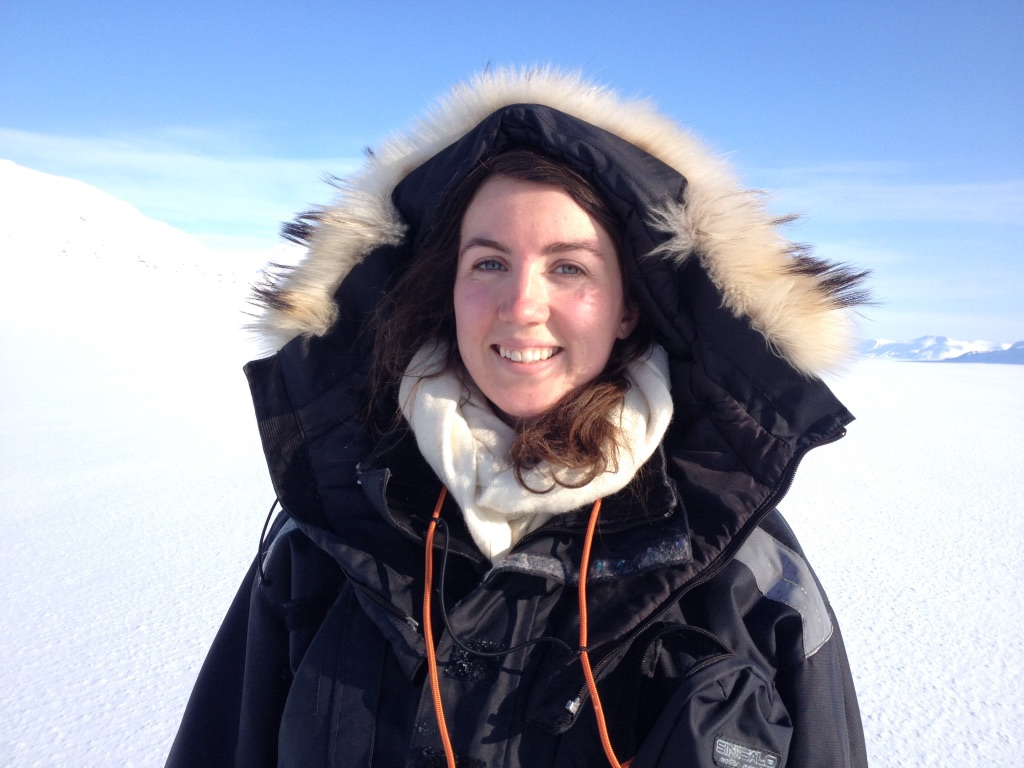
Freya Mitchison during fieldwork in Svalbard
Katherine Turner
- 3rd year PhD student at the University of Liverpool
- Researching how the ocean takes up heat and carbon from carbon emissions, and how that impacts our concept of carbon budgets.
- Her work is at the intersection of science and policy.
“The ocean takes up a large fraction of carbon dioxide from burning fossil fuels and the vast majority of the excess heat that carbon dioxide captures. Without the ocean, today’s climate change would be much larger than our measured 1 degree Celsius.” Katherine Turner
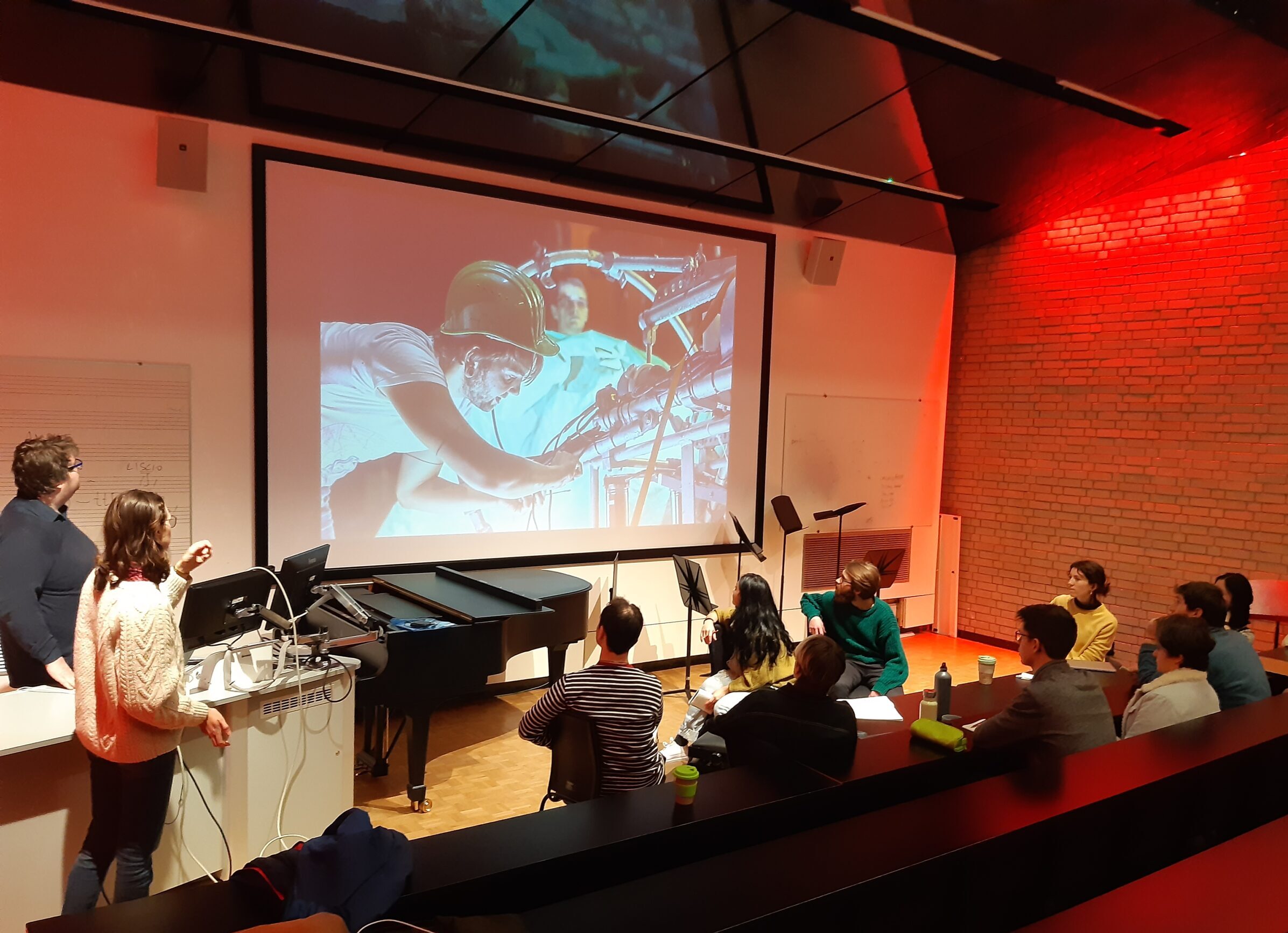
Katherine Turner sharing her work with the group at the workshop on 26 February 2020
Yu Wang
- 3rd year PHD student from University of Manchester.
- Studying the water uptake of atmospheric aerosols in the field and laboratory conditions, and their influence on cloud formation and hydrological cycle.
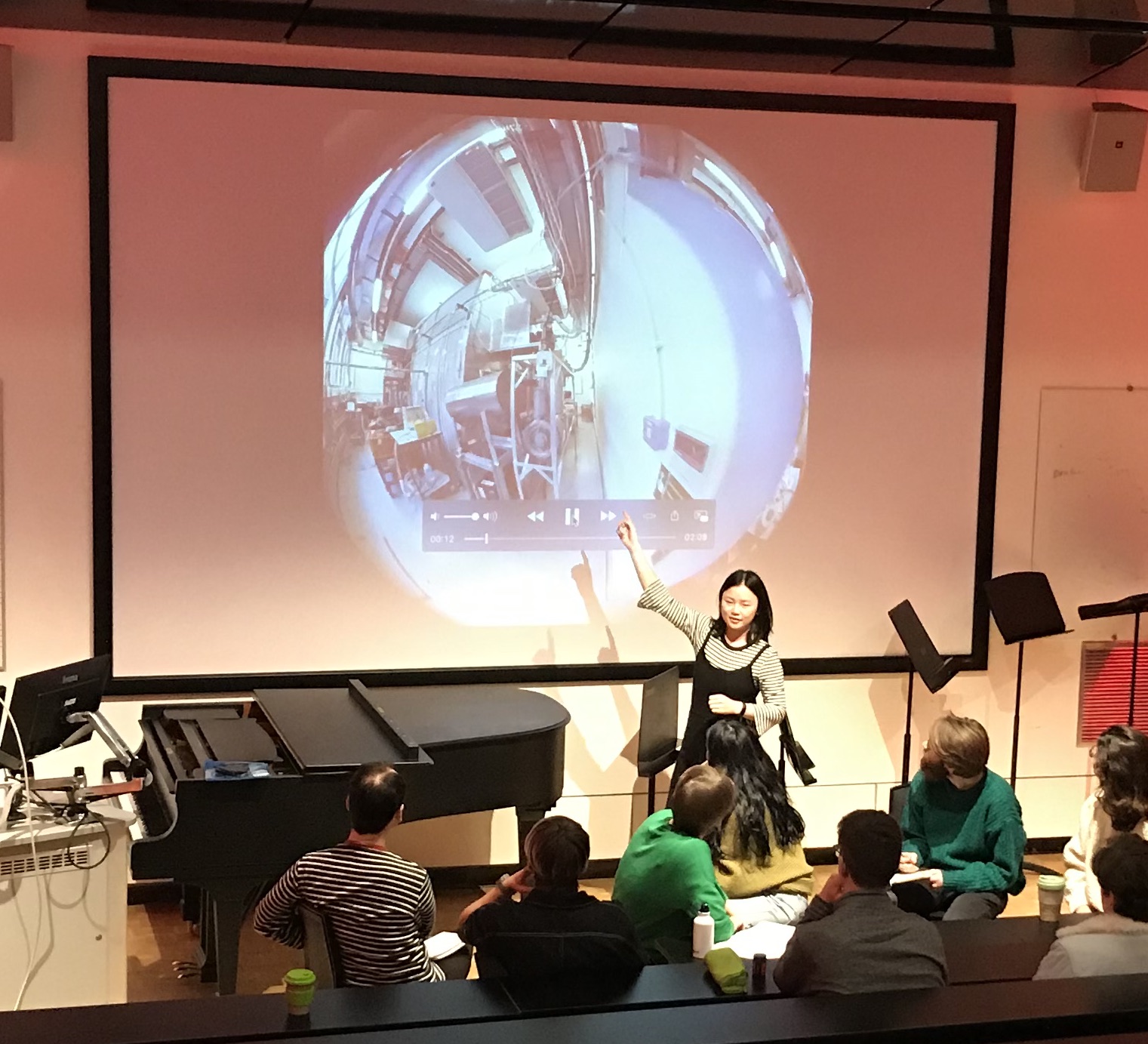
Yu Wang presenting at the first workshop on 26 February 2020
RNCM Composer/Performers
- Nara Garcia Boveda
- José Del Avellanal Carreño
- Simon Knighton
- Tywi Roberts
- Alexia Sloane
- Deane Smith
- Helena Walsh
“It is wonderful to have the opportunity to collaborate with such creative and insightful individuals and to combine scientific research and music in response to one of the most important challenges – if not the most important – of our generation. There is great potential for this project to become something very special and valuable and I feel privileged to be a part of it.” José Del Avellanal Carreño
“We focussed today a great deal on bridging the gap between music as an abstract experience and music as a clear statement, and I felt that we reached some extremely interesting and useful conclusions. By sharing all of our perspectives and hearing from Julia Steinberger and our visiting climate scientists, I certainly feel more confident and excited about the prospect of using music to help bring critical scientific insights to the surface for audiences.” Tywi Roberts
“Before this project I didn’t really know how music could be used to help our planet. But now I feel much more knowledgeable and open to the possibilities of how music can help. Even in these times of isolation, it’s possible.” Deane Smith
“These sessions have provided us with real information about climate change that helps bring our understanding and therefore our art to a new level. The sessions have given us a great chance to discuss composition within this theme with other composers and scientists that will enable all of us to create pieces that are completely different to what we would usually write.” Helena Walsh
A Final Note
Thank you to Freya Mitchison for providing the images used as a header and thumbnails for the project web pages. They are diatoms (photosynthetic algae) that lived between 2-15 million years ago, recovered from Southern Ocean sediment cores. Diatom species, assemblages and shell chemistry help scientists to understand past ocean conditions and how the Antarctic ice sheet evolved through time.


